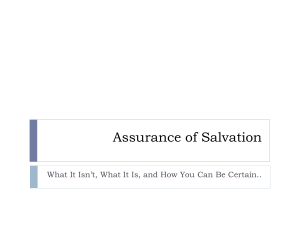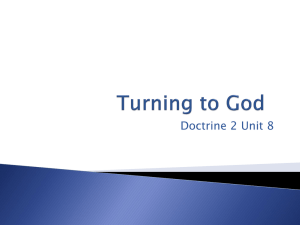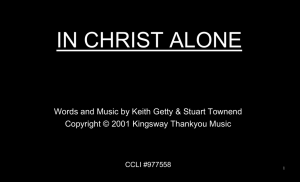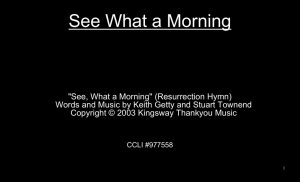04-Assurance-2010-07-12-72-of-124
advertisement
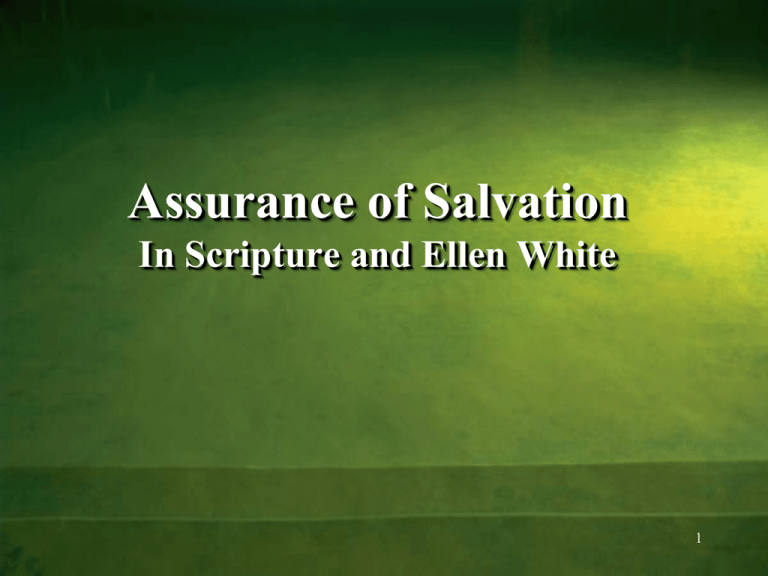
Assurance of Salvation In Scripture and Ellen White 1 • Many Christians who sincerely believe in Jesus do not have confident assurance of present salvation. 2 3 4 Is it true? Did Ellen White deny the doctrine of assurance? Did Ellen White teach that no one should ever say ‘I am saved’? 6 7 8 • It is possible to be saved without being sure of it. (Rom 2:11-16; DA 638) • It is also possible to have false assurance without salvation; that is, to “feel sure” that one is saved, when one isn’t actually saved. Matt 7:21-23: “Many will say to Me in that day, ‘Lord, Lord, have we not prophesied in Your name?’ . . . I will say to them, ‘I never knew you.’” (See also 1T 133-134, 158, 163, 242-243.) 9 10 1. New Birth, forgiveness, cleansing, new heart. 2. Abiding in Christ, through the Holy Spirit. 3. Doing the will of the Father. “Not everyone who says to Me, ‘Lord, Lord,’ shall enter the kingdom of heaven, but he who does the will of My Father in heaven.” Matt 7:21. 11 • New Birth includes 2 elements: Forgiveness of sins, and Cleansing from sin. • “If we confess our sins, He is faithful and just to forgive us our sins and to cleanse us from all unrighteousness. 1John 1:9 12 • Forgiveness of sins, and Cleansing from sin. • “Wash me thoroughly from my iniquity, And cleanse me from my sin. . . . Create in me a clean heart, O God, And renew a right spirit within me. Ps 51:2, 10 13 • Forgiveness of sins, and Cleansing from sin. • “I will cleanse you from all your filthiness and from all your idols. I will give you a new heart and put a new spirit within you; I will take the heart of stone out of your flesh and give you a heart of flesh.” Ezek 36:25, 26. 14 • Forgiveness of sins, and Cleansing from sin. • These texts teach—and we could read many more—that the new birth is both forgiveness and a new creation, a new heart. • 2 Cor 5:14: “If anyone is in Christ, he is a new creation; old things have passed away: behold, all things have become new.” 15 16 Step 1: New Birth, forgiveness, cleansing, new heart. “You are . . . clean, because of the word which I have spoken to you.” John 15:3. Step 2: Abiding in Christ, through the Holy Spirit. “Abide in Me, and I in you. As the branch cannot bear fruit of itself, unless it abides in the vine, neither can you, unless you abide in Me.” John 15:4. 17 Step 1: New Birth, forgiveness, cleansing, new heart. Step 2: Abiding in Christ, through the Holy Spirit. Step 3: Doing the will of the Father. “Not everyone who says to Me, ‘Lord, Lord,’ shall enter the kingdom of heaven, but he who does the will of My Father in heaven.” Matt 7:21 18 • Some read these texts from the viewpoint of predestination, which teaches that God decided before the Creation who would be saved and who would be lost. The ‘elect’ cannot be lost and the ‘non-elect’ can never be saved. • However, the most knowledgeable proponents of this theology admit that it is possible for individuals to think they are among the elect when, in fact, they are not. • Therefore one cannot infallibly know that one 19 was ‘once saved.’ • However, the most knowledgeable proponents of this theology admit that it is possible for individuals to think they are saved, and think they among the elect when, in fact, they are not. • If they eventually fall away, it shows they weren’t truly saved, because the saved cannot fall away. 20 21 22 • “For if, when we were enemies, we were reconciled to God through the death of His Son, much more, having been reconciled, we shall be saved by His life.” Rom 5:10 • “Therefore He is able to save to the uttermost [perfectly and permanently] those who come to God through Him, since He ever lives to make intercession for them.” Heb 7:25 23 • The guarantee of our salvation is not based on the doctrine of predestination, but on the permanent love of One who identified Himself completely with us, died in our place, and “ever lives to make intercession for us.” 24 “So ready, so eager, is the Saviour’s heart to welcome us as members of the family of God, that in the very first words we are to use in approaching God, He places the assurance of our divine relationship, ‘Our Father.’ Here is the announcement…that God loves us as He loves his Son.” (Mount of Blessing, 103-104; John 17:23) 25 • Based on three elements: 1. “Justification through faith in the atoning blood of Christ, 2. the renewing power of the Holy Spirit upon the heart, and 3. fruit brought forth in a life conformed to the example of Christ.” (Great Controversy, 256; compare Acts of the Apostles, 563) 26 • • When you understand these three elements, and how they relate to each other, her view of assurance becomes crystal clear. Each of these elements has both similarities and clear differences from the way they are understood in the popular doctrine of “once saved, always saved.” 27 • The ‘root’ and ‘ground’ of salvation is always and only justification through the work of Christ, which the believer receives by faith. • Unpack and discuss that statement. 28 • Ellen White’s declaration: • “The blessings of the new covenant are grounded purely on mercy in forgiving unrighteousness and sins,” and all who humble their hearts, confessing their sins, will find mercy and grace and assurance.” Letter 276, 1904, in 7BC 931. • How can she say that? 29 • Remember the biblical picture of justification includes both ___ and ___. • 1 John 1:9 • Ps 51: “Create in me a clean heart, O God.” • Ezek 36:26 • 2 Cor 5:14 30 31 32 1. The Objective Basis of Assurance • In other words, justification is not merely a declaration, but a new creation. • “Create in me a clean heart, O God.” Ps 51 33 1. The Objective Basis of Assurance • In other words, justification is not merely a declaration, but a new creation. • “Create in me a clean heart, O God.” Ps 51 • Why am I dwelling so long on this? 34 1. The Objective Basis of Assurance • Because right here is where many Adventists lose all hope of assurance. • If the BASIS of your salvation depends to any extent on the perfection of your performance, you can never be sure. • Many Adventists believe that justification is a declaration only—that God accounts me righteous, even though I am not. That is half right. Half right means a 50-50 mixture of truth and lie. 35 • “Man looketh on the outward appearance, but God looketh on the heart.” 1 Sam 16:7. • If God creates in me a “clean heart,” then my outward appearance may not yet have changed, but God, looking at my new heart, sees that I am a new creation. • He declares me righteous, not contrary to fact, but because, in Christ, my heart has been made righteous. (“Create in me a clean heart, O God” Ps. 51) • “The blessings of the new covenant are grounded purely on mercy in forgiving unrighteousness and sins,” and all who humble their hearts, confessing their sins, will find mercy and grace and assurance.” Letter 276, 1904, in 7BC 931. 38 • Thousands of Christians, including some Adventists, “depend on their obedience to the law of God to commend them to His favor. When they are bidden to look to Jesus, and believe that He saves them solely through His grace, they exclaim, ‘How can these things be?’ ” (DA 175) 39 40 “The thought that the righteousness of Christ is imputed to us, not because of any merit on our part, but as a free gift from God, is a precious thought. The enemy of God , and man is not willing that this truth should be clearly presented; for he knows that if the people receive it fully, his power will be broken…” 41 • Satan seeks to confuse this issue because this is the central truth that frees us from his power. • He knows that “if he can control minds so that doubt and unbelief and darkness shall compose the experience of those who claim to be the children of God, he can overcome them with temptation.” Gospel Workers, 161 42 43 • Intellectual belief in the facts of the gospel, • Trust in the personal character of God and Christ, and • Voluntary surrender of the will to God 44 45 • “A nominal faith in Christ, which accepts Him merely as the Saviour of the world, can never bring healing to the soul. The faith that is unto salvation is not a mere intellectual assent to the truth…It is not enough to believe about Christ; we must believe in Him… (DA 347). 46 • “The only faith that will benefit us is that which embraces Him as a personal Saviour; which appropriates His merits to ourselves. Many hold faith as an opinion. Saving faith is a transaction by which those who receive Christ join themselves in covenant relation with God…”(DA 347). 47 48 49 • “Christ…is anxious to be our Helper, to bear our griefs and carry our sorrows. Will you let him help you? Say to the world, ‘Jesus is my Saviour; he saves me today, making me his obedient child, and enabling me to keep all his commandments. (ST June 8, 1891). 50 “There is no saving faith that does not produce good fruit… the moment true faith in the merits of the costly atoning sacrifice is exercised, claiming Christ as a personal Saviour, that moment the sinner is justified before God.” (Ms 46, 1891, in 8MR 357) 51 • When Christ is received by faith, the Spirit of God produces a new life in the soul (Rom 6:4-11-14; 8:9-11; Gal 2 :20-21; Eph 2:5-6; Col 1:27; 3:1-10 ) • This “life in the soul” is the actual beginning of “the life eternal” (DA 176, 331) 52 This insistence on the absolute necessity of ongoing “life in the soul” is the critical difference between biblical assurance and the popular notion that a one-time act of believing guarantees eternal security. 53 • “We must not base our salvation upon supposition; we must know of a surety that Christ is formed within, the hope of glory. We must know that we can hold communion with God. Then if He should come to us quickly, if by any chance our life should suddenly be ended, we would be ready to meet our God” (Ms 21, 1903, in 6MR 32) 54 • This ongoing “life of the soul” is the difference between those who merely profess faith in Christ and those who truly know Him and walk by faith in Him. It is both the believer’s highest privilege and the most basic essential. 55 56 57 • We are “always carrying about in the body the dying if the Lord Jesus, that the life of Jesus also may be manifested in our body (2 Cor 4:10). • “For if you live according to the flesh, you will die; but if by the Spirit you put to death the deeds of the flesh, you will live” (Rom 8:13) 58 59 • A mere assent to this union, while the affections are not detached from the world, its pleasures and its dissipations, only emboldens the heart of disobedience” (ST Nov.29, 1910, in 5BC 1143-1144). The inevitable result of false assurance is to “embolden the heart in disobedience.” 60 • The dying is both once for all (with Christ on the cross, Rom 6:3, 6, 11; 2 Cor 5:1415), and a continuing process (2 Cor 4:10). The continuing process means that it is never finished in this life until we lay off this “body of death” (Rom 7:24). 61 62 63 • Thus she says, “no man can empty himself of self. We can only consent for Christ to accomplish the work. • “Then the language of the soul will be, Lord, take my heart; for I cannot give it. It is thy property. Keep it pure, for I cannot keep it for Thee. Save me in spite of myself, my weak, unchristlike self” (COL 159). 64 65 The Third Element of Assurance is the External Evidence of Salvation • Fruit bearing in obedience and loving service • (John 15:1-8; Gal 5:22-23; Col 3:1-11). 66 67 68 • “If Christ is dwelling in the heart [step 2], it is impossible to conceal His presence” (MB 41) • This impossibility of concealing the divine life in the soul is the consideration that explains Ellen White’s frequent emphasis on the external evidence of salvation 69 • The lack of visible change [step 3] in the life of a professed Christian she regards as clear evidence that there is no divine life within [step 2], hence that the new birth [step 1] has not yet occurred. If [step 1] the new birth has not yet occurred, the person does not have salvation, and any claim to assurance would be self-deception. 70 Summarizing 1. The ground of assurance is justification by grace alone through faith alone 2. The experience of assurance is the ongoing life of the Holy Spirit in the soul 3. The outward evidence of assurance is fruit bearing in obedience and loving service 71 • Where any of these is absent, assurance must be called in question. • Where these are present believers should rejoice and not let Satan steal away their sense of security. 72 • Assurance is maintained by faith, through a daily (continual) union with Christ (John 15:4-5’ Phil 4:13; Col 2:6; 1 John 5:11-13) • “Nothing is apparently more helpless, yet really more invincible, than the soul that feels its nothingness and relies wholly on the merits of the Saviour.” 74 75 • A Biblical concept of security recognizes that biblical teaching that believers retain for eternity the freedom to turn away from God. (Ezek 33:12-20) • Hence the necessity and privilege of a daily renewal of conversion (Luke 9:23) 76 • But for those who yield to the Lordship of Christ through the Holy Spirit, daily responding to His love and daily seeking a more complete surrender to His will, there is an abundant and solid security. 77 • It is not the security of an irreversible guarantee, but the security of serving a God whose persistence in seeking the sinner goes far beyond the weakness of the believer’s faith (John 10:28; Luke 10:20; 15:4-7, 8-10, 20-24; 1 John 1:9; 2:1; Rom 5:10; 8:28-30. 35-39) 78 79 • Thus she writes, “All who have put on the robe of Christ’s righteousness will stand before Him as chosen and faithful and true. Satan has no power to pluck them out of the hand of the Saviour. Not one soul who in penitence and faith has claimed His protection will Christ permit to pass under the enemy’s power” (PK 587, on Zech 3:47; cf. MB 71 and 1Cor 10:13) 80 • EGW favorite text on security • 1 John 2:1 • She wrote a letter to a woman who was in desperate need of assurance • White reported hearing this text in vision quoted by an angel. 81 82 83 • Confronting some ministers, delegates at the 1883 General Conference, who were anxious and worried, “talking fears and doubts” as to whether they would be saved, she challenged, “Brethren, you have expressed many doubts; but have you followed your Guide? You must dispense with [Him] before you can lose your way; for the Lord has hedged you in on every side” • (RH, April 15, 1884) 84 • “Faith comes by the word of God. Then grasp His promise, ‘Him that cometh to Me I will in no wise cast out.’ John 6:37. Cast yourself at His feet with the cry, ‘Lord, I believe; help Thou mine unbelief.’ You can never perish while you do this— never” (DA 429) 85 86 • The ground of salvation is the merit of Christ alone • To those seeking to merit salvation, she writes, “It makes all the difference in the world with us spiritually whether we rely upon God without doubt, as upon a sure foundation , or whether we are seeking to find some righteousness in ourselves before we come to Him. Look away from self to the Lamb of God, that taketh away the sin of the world.” 87 Those who “seem to feel that they must be on probation and must prove to the Lord that they are reformed before they can claim His blessing,” she reassures that “these dear souls may claim the blessing of God even now. They must have His grace, the spirit of Christ to help their infirmities, or they cannot form Christian characters. Jesus loves to have us come to Him just as we are-sinful, helpless, dependent.” RH April 22, 1884 88 89 • “Each one of you may know for yourself that you have a living Saviour, that he is your helper and your God. You need not stand where you say, ‘I do not know whether I am saved.’” GCB, April 10, 1901 par. 14 90 91 92 The Danger of False Assurance • “We are never to rest in a satisfied condition, and cease to make advancement, saying, ‘I am saved.’” 1 SM 314 • “When this idea is entertained, the motives for watchfulness, for prayers, for earnest endeavor to press onward to higher attainments, cease to exist…” 1 SM 314 93 94 • “Never can we safely put confidence in self or feel, this side of heaven, that we are secure against temptations…Those who accept Christ, and in their first confidence say, I am saved, are in danger of trusting to themselves.” COL 155 95 • “Our only safety is in constant distrust of self, and dependence on Christ” (COL 155). • “Saved” is here equated with putting “confidence in self” and feeling that one is “secure against temptation.” • “When we give ourselves to Christ” we may “know that He accepts us,” showing that her opposition is not against true biblical assurance, but against presumption leading to false assurance. 96 How EGW Thinks on Righteousness by Faith 1. On the one hand, she is deeply concerned to protect believers against Satan’s devices of self-confidence and self-dependence 2. On the other hand, she is equally concerned that believers have legitimate biblical assurance, that is based in Christ, not in self 97 98 • On the one hand, she knows the danger of going to the over-confident extreme (false assurance). • On the other hand, she knows you can also fail spiritually by focusing on your own performances as the basis of your acceptance with God (legalism). 99 • She is always seeking to guard against these two extremes. • Which category (caution or encouragement) predominates in a given passage depends on the audience and context. • In some testimonies of rebuke, the rebuke may predominate, but the encouragement is there also if you look for it. 100 101 • This is what I have elsewhere referred to as the paradigm shift that occurs when a person realizes that Ellen White is really a believer in righteousness by faith. • I have of an old man, hard-headed, do-it-yourself, strong-willed believer in sanctification by stern effort, who late in life confessed, “I never used to find righteousness by faith in the writings of Ellen White, but when you see it, it’s everywhere you look.” 102 103 104 The Necessity of True Assurance • Of herself she wrote, “Jesus has saved me, though I had nothing to present to Him” (RH, July 14, 1891, par.11) • “The perishing sinner…need not remain a moment longer unsaved’” (1SM 392) • Repentant sinners may “claim the blessing of God even now” (GCB April 10, 1901, par. 14) 105 106 • “My little children, these things I write to you may not sin. And if anyone sins, we have an Advocate with the Father, Jesus Christ the righteous” (1 John 2:1). • Again she wrote, “if any man sin, he is not to give himself up to despair, and talk like a man who is lost to Christ. “If any man sin, we have an Advocate with the Father, Jesus Christ the righteous” (ST, Jan. 3, 1895) 107 What Happens to Assurance When We Sin? • Salvation is a gift which precedes and enables overcoming. • “Some seem to feel that they must be on probation, and must prove to the Lord that they are reformed, before they can claim His blessing. But they may claim the blessing of God even now. They must have His grace, the Spirit of Christ, to help their infirmities, or they cannot resist evil.” Steps to Christ, 52. 108 • Jesus loves to have us come to Him just as we are, sinful, helpless, dependent. We may come with all our weakness, our folly, our sinfulness, and fall at His feet in penitence. • It is His glory to encircle us in the arms of His love and to bind up our wounds, to cleanse us from all impurity” (SC 52) 109 • To go forward without stumbling, we must have the assurance that a hand all-powerful will hold us up, and an infinite pity be exercised toward us if we fall. God alone can at all times hear our cry for help” (ST, July 28, 1881) • Our steadfast goal must be, not to sin. But if that is our goal, we are not cast off when we fall (1 Jn 2:1) 110 • There are those who have known the pardoning love of Christ and who really desire to be children of God, yet they realize that their character is imperfect, their life, and they are ready to doubt whether their hearts have been renewed by the Holy Spirit… 111 112 113 115 “When you fell into sin you walked in darkness. When you yielded to temptation, you must have ceased to look unto Jesus, the Author and Finisher of your faith. But, having confessed your sins, believe that the word of God cannot fail, but that he is faithful that hath promised. It is just as much your duty to believe that God will fulfill his word, and forgive your sins, as it is your duty to confess your sins.” 116 • The one who is striving for an uninterrupted connection with God stands in a different position than the unbelieving sinner. • He learns a lesson from the words of the Master, and takes heed that he be not again deceived. 117 • Ellen White’s warnings against the misuse of the claim, “I am saved” were not directed at a true biblical concept of present assurance in Christ, but against the idea of an irreversible guarantee leading to selfconfidence, presumption, and casual disobedience. 118 • She was just as forceful about the necessity of true present assurance, understood in the context of justification by faith, daily abiding in connection with Christ, and obedience to the known will of God. 119 • Those who come to God daily, trusting in His love, feeding on His word, and submitting themselves to His loving discipline, are “right with God today,” and “ready if Christ should come today” (HP 227). And every day we live by faith makes it easier and more likely that we will make that choice again tomorrow. Romans 5:10. 120 Morning Prayer 125 126



